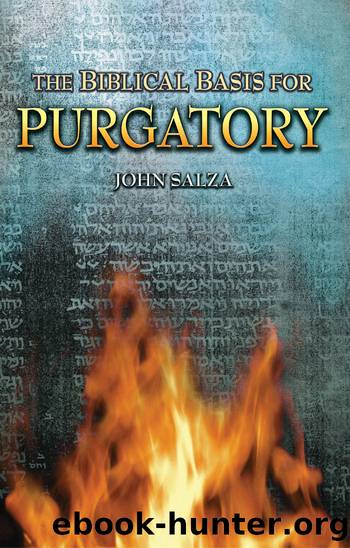The Biblical Basis for Purgatory by John Salza

Author:John Salza [Salza, John]
Language: eng
Format: epub
ISBN: 9781935302971
Publisher: St. Benedict Press LLC
Published: 0101-01-01T00:00:00+00:00
Paul says that the man who built with only good materials is saved (he receives his ârewardâ), and the man who built with only bad materials is condemned (he is âdestroyedâ). This is because the good materials represent good works and the bad materials represent evil works. This teaching reiterates the polarity of the salvation/damnation scenario that Paul describes in Romans 2:7-8 in regard to oneâs works: those who do good works are rewarded with âeternal life,â and those who do bad works are subject to âwrath and fury.â In other words, if people are condemned for bad works, then people are saved (not just rewarded) for good works.
What about the man who built with both good and bad materials? Paul explains: âIf any manâs work is burned up, he will suffer loss, though he himself will be saved, but only as through fire.â The man âsuffers lossâ because some of his âwork is burned up.â The Greek for âsuffer lossâ (zemiothesetai) refers to punishment, which means the saved man is punished after death for his bad works. The New Testament uses this word (from the Greek verb zemioo) even to describe eternal punishment.198 The Old Testament also uses the word (from the Hebrew, anash) to mean âpenalty,â âpunish,â or âsuffer.â199 In addition, the Old Testament uses the word (anash/zemioo) to describe a monetary âfine.â200
This means there is a connection between the âfineâ of 1 Corinthians 3:15 and the âpayment of the last pennyâ in Matthew 5:26. Both use monetary metaphors to describe temporal punishments in the afterlife imposed for bad deeds. In the case of Matthew 5, the man is imprisoned which refers to the âpain of lossâ and âpain of durationâ that we previously discussed. In 1 Corinthians 3, the man suffers loss from fire which refers to the âpain of sense.â
What is critical to note in 1 Corinthians 3:15 is that the man is punished after death for building with bad materials, but he is still saved. The Greek for âwill be savedâ (sothesetai) refers to nothing less than the salvation with which God rewards the Elect at the end of their lives. Needless to say, a post-mortem punishment by fire that precedes salvation is utterly foreign to Protestant theology. If a manâs sins have already been washed away by the imputed righteousness of Christ, how can he be punished for those sins after death? Because this passage is so damaging to Protestant theology, Protestant apologists have scrambled to come up with rebuttals. Let us briefly examine the most common ones.
Download
This site does not store any files on its server. We only index and link to content provided by other sites. Please contact the content providers to delete copyright contents if any and email us, we'll remove relevant links or contents immediately.
The Secret Power of Speaking God's Word by Joyce Meyer(3135)
Signature in the Cell: DNA and the Evidence for Intelligent Design by Stephen C. Meyer(3114)
Real Sex by Lauren F. Winner(3000)
The Holy Spirit by Billy Graham(2931)
The Gnostic Gospels by Pagels Elaine(2515)
Jesus by Paul Johnson(2347)
Devil, The by Almond Philip C(2318)
23:27 by H. L. Roberts(2236)
The Nativity by Geza Vermes(2217)
Chosen by God by R. C. Sproul(2148)
All Things New by John Eldredge(2145)
Angels of God: The Bible, the Church and the Heavenly Hosts by Mike Aquilina(1948)
The Return of the Gods by Erich von Daniken(1920)
Angels by Billy Graham(1913)
Knowing God by J.I. Packer(1841)
Jesus of Nazareth by Joseph Ratzinger(1795)
The Gnostic Gospel of St. Thomas by Tau Malachi(1778)
Evidence of the Afterlife by Jeffrey Long(1772)
How To Be Born Again by Billy Graham(1770)
